Illustrated London News (29 April 1922)
Works
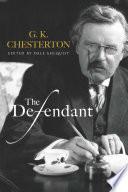
The Defendant
G. K. Chesterton
Charles Dickens
G. K. Chesterton
The Innocence of Father Brown
G. K. Chesterton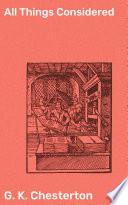
All Things Considered
G. K. Chesterton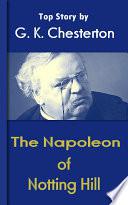
The Napoleon of Notting Hill
G. K. Chesterton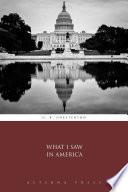
What I Saw in America
G. K. Chesterton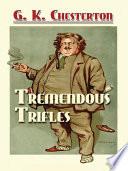
Tremendous Trifles
G. K. Chesterton
The Secret of Father Brown
G. K. Chesterton
The Club of Queer Trades
G. K. Chesterton
The Scandal of Father Brown
G. K. ChestertonThe Ball and the Cross
G. K. Chesterton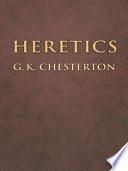
Heretics
G. K. Chesterton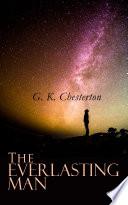
The Everlasting Man
G. K. Chesterton
The Flying Inn
G. K. Chesterton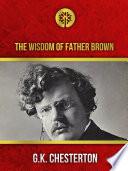
The Wisdom of Father Brown
G. K. Chesterton
William Blake
G. K. Chesterton
Eugenics and other Evils
G. K. Chesterton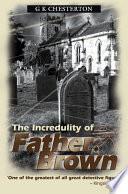
The Incredulity of Father Brown
G. K. ChestertonFamous G. K. Chesterton Quotes
"The Future of Democracy"
What I Saw in America (1922)
Context: There is truth in every ancient fable, and there is here even something of it in the fancy that finds the symbol of the Republic in the bird that bore the bolts of Jove. Owls and bats may wander where they will in darkness, and for them as for the sceptics the universe may have no centre; kites and vultures may linger as they like over carrion, and for them as for the plutocrats existence may have no origin and no end; but it was far back in the land of legends, where instincts find their true images, that the cry went forth that freedom is an eagle, whose glory is gazing at the sun.
Letters on Polish Affairs (1922)
Source: https://archive.org/stream/lettersonpolisha00sarouoft/lettersonpolisha00sarouoft_djvu.txt
The Father Brown Mystery Series (1910 - 1927)
Source: The Secret of Father Brown (1927) The Chief Mourner of Marne
"Introduction"
The Defendant (1901)
Context: The pessimist is commonly spoken of as the man in revolt. He is not. Firstly, because it requires some cheerfulness to continue in revolt, and secondly, because pessimism appeals to the weaker side of everybody, and the pessimist, therefore, drives as roaring a trade as the publican. The person who is really in revolt is the optimist, who generally lives and dies in a desperate and suicidal effort to persuade all the other people how good they are. It has been proved a hundred times over that if you really wish to enrage people and make them angry, even unto death, the right way to do it is to tell them that they are all the sons of God.
G. K. Chesterton Quotes about men
Collected Works of G.K. Chesterton : The Illustrated London News, 1905-1907 (1986), p. 191
"The Ethics of Elfland" https://www.ccel.org/ccel/chesterton/orthodoxy.vii.html in Delphi Works of G. K. Chesterton
The Club of Queer Trades http://books.google.com/books?id=mjcdk4InFzoC&q="Men+always+talk+about+the+most+important+things+to+total+strangers+it+is+because+in+the+total+stranger+we+perceive+man+himself+the+image+of+God+is+not+disguised+by+resemblances+to+an+uncle+or+doubts+of+the+wisdom+of+a+moustache"&pg=PT93#v=onepage (1905) Ch. 5 "The Noticeable Conduct of Professor Chadd"
book The Club of Queer Trades
Source: Utopia of Usurers (1917), pp. 15-17
According to Larry Azar (Evolution and Other Fairy Tales, AuthorHouse, 2005, p. 470), Chesterton made this statement on 16 March 1907
G. K. Chesterton Quotes about people
Child Psychology and Nonsense (15 October 1921)
Illustrated London News (3 June 1922)
"The Case for the Ephemeral"
All Things Considered (1908)
Context: I cannot understand the people who take literature seriously; but I can love them, and I do. Out of my love I warn them to keep clear of this book. It is a collection of crude and shapeless papers upon current or rather flying subjects; and they must be published pretty much as they stand. They were written, as a rule, at the last moment; they were handed in the moment before it was too late, and I do not think that our commonwealth would have been shaken to its foundations if they had been handed in the moment after. They must go out now, with all their imperfections on their head, or rather on mine; for their vices are too vital to be improved with a blue pencil, or with anything I can think of, except dynamite.
Their chief vice is that so many of them are very serious; because I had no time to make them flippant. It is so easy to be solemn; it is so hard to be frivolous.
Source: Charles Dickens (1906), Ch 1 : "The Dickens Period"
“When people stop believing in God, they don’t believe in nothing — they believe in anything.”
This quotation actually comes from page 211 of Émile Cammaerts' book The Laughing Prophet : The Seven Virtues and G. K. Chesterton (1937) in which he quotes Chesterton as having Father Brown say, in "The Oracle of the Dog" (1923): "It's the first effect of not believing in God that you lose your common sense." Cammaerts then interposes his own analysis between further quotes from Father Brown: "'It's drowning all your old rationalism and scepticism, it's coming in like a sea; and the name of it is superstition.' The first effect of not believing in God is to believe in anything: 'And a dog is an omen and a cat is a mystery.'" Note that the remark about believing in anything is outside the quotation marks — it is Cammaerts. The correct attribution was reportedly first traced by Pasquale Accardo. http://www.chesterton.org/ceases-to-worship/ It was also credited to Nigel Rees (as cited in First Things, 1997). http://books.google.com/books?id=NuQnAAAAYAAJ&q=%22The+first+effect+of+not+believing+in+God+is+to+believe+in+anything%22&dq=%22The+first+effect+of+not+believing+in+God+is+to+believe+in+anything%22&hl=en&ei=PSzcTvewIefx0gHqmrj0DQ&sa=X&oi=book_result&ct=result&resnum=2&ved=0CDUQ6AEwAQ
Misattributed
The Dagger with Wings (1926)
G. K. Chesterton: Trending quotes
“There is a road from the eye to the heart that does not go through the intellect.”
"A Defence of Heraldry"
The Defendant (1901)
Context: There is a road from the eye to the heart that does not go through the intellect. Men do not quarrel about the meaning of sunsets; they never dispute that the hawthorn says the best and wittiest thing about the spring.
The Meaning of The Crusade. (1920)
Context: Christendom might quite reasonably have been alarmed if it had not been attacked. But as a matter of history it had been attacked. The Crusader would have been quite justified in suspecting the Moslem even if the Moslem had merely been a new stranger; but as a matter of history he was already an old enemy. The critic of the Crusade talks as if it had sought out some inoffensive tribe or temple in the interior of Thibet, which was never discovered until it was invaded. They seem entirely to forget that long before the Crusaders had dreamed of riding to Jerusalem, the Moslems had almost ridden into Paris. They seem to forget that if the Crusaders nearly conquered Palestine, it was but a return upon the Moslems who had nearly conquered Europe.
Source: Tremendous Trifles (1909), Ch. XXXI: "The Riddle of the Ivy"
G. K. Chesterton Quotes
The Superstition of Divorce (1920)
Context: I do not ask them to assume the worth of my creed or any creed; and I could wish they did not so often ask me to assume the worth of their worthless, poisonous plutocratic modern society. But if it could be shown, as I think it can, that a long historical view and a patient political experience can at last accumulate solid scientific evidence of the vital need of such a vow, then I can conceive no more tremendous tribute than this, to any faith, which made a flaming affirmation from the darkest beginnings, of what the latest enlightenment can only slowly discover in the end.
"Fads and Public Opinion"
What I Saw in America (1922)
Context: The truth is that prohibitions might have done far less harm as prohibitions, if a vague association had not arisen, on some dark day of human unreason, between prohibition and progress. And it was the progress that did the harm, not the prohibition. Men can enjoy life under considerable limitations, if they can be sure of their limited enjoyments; but under Progressive Puritanism we can never be sure of anything. The curse of it is not limitation; it is unlimited limitation. The evil is not in the restriction; but in the fact that nothing can ever restrict the restriction. The prohibitions are bound to progress point by point; more and more human rights and pleasures must of necessity be taken away; for it is of the nature of this futurism that the latest fad is the faith of the future, and the most fantastic fad inevitably makes the pace. Thus the worst thing in the seventeenth-century aberration was not so much Puritanism as sectarianism. It searched for truth not by synthesis but by subdivision. It not only broke religion into small pieces, but it was bound to choose the smallest piece.
“Yet these shall perish and understand,
For God has pity on this great land.”
Who Goes Home? (1914)
Context: In the city set upon slime and loam,
They cry in their Parliament, "Who goes home?"
And there comes no answer in arch or dome,
For none in the city of graves goes home.
Yet these shall perish and understand,
For God has pity on this great land.
A Defence of Baby-Worship
The Defendant (1901)
Context: When we reverence anything in the mature, it is their virtues or their wisdom, and this is an easy matter. But we reverence the faults and follies of children.
We should probably come considerably nearer to the true conception of things if we treated all grown-up persons, of all titles and types, with precisely that dark affection and dazed respect with which we treat the infantile limitations.
"Doubts About Darwinism", in The Illustrated London News (17 July 1920)
Context: And I will add this point of merely personal experience of humanity: when men have a real explanation they explain it, eagerly and copiously and in common speech, as Huxley freely gave it when he thought he had it. When they have no explanation to offer, they give short dignified replies, disdainful of the ignorance of the multitude.
Tolstoy (1903)
Context: The truth is that Tolstoy, with his immense genius, with his colossal faith, with his vast fearlessness and vast knowledge of life, is deficient in one faculty and one faculty alone. He is not a mystic; and therefore he has a tendency to go mad. Men talk of the extravagances and frenzies that have been produced by mysticism; they are a mere drop in the bucket. In the main, and from the beginning of time, mysticism has kept men sane. The thing that has driven them mad was logic.... The only thing that has kept the race of men from the mad extremes of the convent and the pirate-galley, the night-club and the lethal chamber, has been mysticism — the belief that logic is misleading, and that things are not what they seem.
"A Defence of Baby-Worship"
The Defendant (1901)
Context: The essential rectitude of our view of children lies in the fact that we feel them and their ways to be supernatural while, for some mysterious reason, we do not feel ourselves or our own ways to be supernatural. The very smallness of children makes it possible to regard them as marvels; we seem to be dealing with a new race, only to be seen through a microscope. I doubt if anyone of any tenderness or imagination can see the hand of a child and not be a little frightened of it. It is awful to think of the essential human energy moving so tiny a thing; it is like imagining that human nature could live in the wing of a butterfly or the leaf of a tree. When we look upon lives so human and yet so small, we feel as if we ourselves were enlarged to an embarrassing bigness of stature. We feel the same kind of obligation to these creatures that a deity might feel if he had created something that he could not understand.
"A Defence of Baby-Worship"
The Defendant (1901)
Context: The most unfathomable schools and sages have never attained to the gravity which dwells in the eyes of a baby of three months old. It is the gravity of astonishment at the universe, and astonishment at the universe is not mysticism, but a transcendent common-sense. The fascination of children lies in this: that with each of them all things are remade, and the universe is put again upon its trial. As we walk the streets and see below us those delightful bulbous heads, three times too big for the body, which mark these human mushrooms, we ought always primarily to remember that within every one of these heads there is a new universe, as new as it was on the seventh day of creation. In each of those orbs there is a new system of stars, new grass, new cities, a new sea.
Illustrated London News (1924)
Context: The whole modern world has divided itself into Conservatives and Progressives. The business of Progressives is to go on making mistakes. The business of Conservatives is to prevent mistakes from being corrected. Even when the revolutionist might himself repent of his revolution, the traditionalist is already defending it as part of his tradition. Thus we have two great types — the advanced person who rushes us into ruin, and the retrospective person who admires the ruins. He admires them especially by moonlight, not to say moonshine. Each new blunder of the progressive or prig becomes instantly a legend of immemorial antiquity for the snob. This is called the balance, or mutual check, in our Constitution.
What I Saw in America (1922)
Context: The truth is that prohibitions might have done far less harm as prohibitions, if a vague association had not arisen, on some dark day of human unreason, between prohibition and progress. And it was the progress that did the harm, not the prohibition. Men can enjoy life under considerable limitations, if they can be sure of their limited enjoyments; but under Progressive Puritanism we can never be sure of anything. The curse of it is not limitation; it is unlimited limitation. The evil is not in the restriction; but in the fact that nothing can ever restrict the restriction. The prohibitions are bound to progress point by point; more and more human rights and pleasures must of necessity be taken away; for it is of the nature of this futurism that the latest fad is the faith of the future, and the most fantastic fad inevitably makes the pace. Thus the worst thing in the seventeenth-century aberration was not so much Puritanism as sectarianism. It searched for truth not by synthesis but by subdivision. It not only broke religion into small pieces, but it was bound to choose the smallest piece.
"Fads and Public Opinion"
The Superstition of Divorce (1920)
Context: I do not ask them to assume the worth of my creed or any creed; and I could wish they did not so often ask me to assume the worth of their worthless, poisonous plutocratic modern society. But if it could be shown, as I think it can, that a long historical view and a patient political experience can at last accumulate solid scientific evidence of the vital need of such a vow, then I can conceive no more tremendous tribute than this, to any faith, which made a flaming affirmation from the darkest beginnings, of what the latest enlightenment can only slowly discover in the end.
“The pure modernist is merely a snob; he cannot bear to be a month behind the fashion.”
"The Case for the Ephemeral"
All Things Considered (1908)
Context: It is incomprehensible to me that any thinker can calmly call himself a modernist; he might as well call himself a Thursdayite. … The real objection to modernism is simply that it is a form of snobbishness. It is an attempt to crush a rational opponent not by reason, but by some mystery of superiority, by hinting that one is specially up to date or particularly "in the know." To flaunt the fact that we have had all the last books from Germany is simply vulgar; like flaunting the fact that we have had all the last bonnets from Paris. To introduce into philosophical discussions a sneer at a creed’s antiquity is like introducing a sneer at a lady’s age. It is caddish because it is irrelevant. The pure modernist is merely a snob; he cannot bear to be a month behind the fashion.
“So long as he does both he can create: for he is making an outline and a shape.”
Ch I: The Victorian Compromise and Its Enemies (p. 20)
The Victorian Age in Literature (1913)
Context: A man making the confession of any creed worth ten minutes' intelligent talk, is always a man who gains something and gives up something. So long as he does both he can create: for he is making an outline and a shape.
Source: The Thing (1929), Ch. IV : The Drift From Domesticity
Context: In the matter of reforming things, as distinct from deforming them, there is one plain and simple principle; a principle which will probably be called a paradox. There exists in such a case a certain institution or law; let us say, for the sake of simplicity, a fence or gate erected across a road. The more modern type of reformer goes gaily up to it and says, "I don't see the use of this; let us clear it away." To which the more intelligent type of reformer will do well to answer: "If you don't see the use of it, I certainly won't let you clear it away. Go away and think. Then, when you can come back and tell me that you do see the use of it, I may allow you to destroy it."
This paradox rests on the most elementary common sense. The gate or fence did not grow there. It was not set up by somnambulists who built it in their sleep. It is highly improbable that it was put there by escaped lunatics who were for some reason loose in the street. Some person had some reason for thinking it would be a good thing for somebody. And until we know what the reason was, we really cannot judge whether the reason was reasonable. It is extremely probable that we have overlooked some whole aspect of the question, if something set up by human beings like ourselves seems to be entirely meaningless and mysterious. There are reformers who get over this difficulty by assuming that all their fathers were fools; but if that be so, we can only say that folly appears to be a hereditary disease. But the truth is that nobody has any business to destroy a social institution until he has really seen it as an historical institution. If he knows how it arose, and what purposes it was supposed to serve, he may really be able to say that they were bad purposes, or that they have since become bad purposes, or that they are purposes which are no longer served. But if he simply stares at the thing as a senseless monstrosity that has somehow sprung up in his path, it is he and not the traditionalist who is suffering from an illusion.
“It is so easy to be solemn; it is so hard to be frivolous.”
"The Case for the Ephemeral"
All Things Considered (1908)
Context: I cannot understand the people who take literature seriously; but I can love them, and I do. Out of my love I warn them to keep clear of this book. It is a collection of crude and shapeless papers upon current or rather flying subjects; and they must be published pretty much as they stand. They were written, as a rule, at the last moment; they were handed in the moment before it was too late, and I do not think that our commonwealth would have been shaken to its foundations if they had been handed in the moment after. They must go out now, with all their imperfections on their head, or rather on mine; for their vices are too vital to be improved with a blue pencil, or with anything I can think of, except dynamite.
Their chief vice is that so many of them are very serious; because I had no time to make them flippant. It is so easy to be solemn; it is so hard to be frivolous.
“Whatever may be the reason, we all do warmly respect humility — in other people.”
"A Defence of Humilities"
The Defendant (1901)
Context: We all know that the 'divine glory of the ego' is socially a great nuisance; we all do actually value our friends for modesty, freshness, and simplicity of heart. Whatever may be the reason, we all do warmly respect humility — in other people.
"Oxford from Without"
All Things Considered (1908)
Context: It is not only possible to say a great deal in praise of play; it is really possible to say the highest things in praise of it. It might reasonably be maintained that the true object of all human life is play. Earth is a task garden; heaven is a playground. To be at last in such secure innocence that one can juggle with the universe and the stars, to be so good that one can treat everything as a joke — that may be, perhaps, the real end and final holiday of human souls.
Opening lines
The Napoleon of Notting Hill (1904)
Context: The human race, to which so many of my readers belong, has been playing at children’s games from the beginning, and will probably do it till the end, which is a nuisance for the few people who grow up. And one of the games to which it is most attached is called “Keep to-morrow dark,” and which is also named (by the rustics in Shropshire, I have no doubt) “Cheat the Prophet.” The players listen very carefully and respectfully to all that the clever men have to say about what is to happen in the next generation. The players then wait until all the clever men are dead, and bury them nicely. They then go and do something else. That is all. For a race of simple tastes, however, it is great fun.
For human beings, being children, have the childish wilfulness and the childish secrecy. And they never have from the beginning of the world done what the wise men have seen to be inevitable.
"The Case for the Ephemeral"
All Things Considered (1908)
Context: It is incomprehensible to me that any thinker can calmly call himself a modernist; he might as well call himself a Thursdayite. … The real objection to modernism is simply that it is a form of snobbishness. It is an attempt to crush a rational opponent not by reason, but by some mystery of superiority, by hinting that one is specially up to date or particularly "in the know." To flaunt the fact that we have had all the last books from Germany is simply vulgar; like flaunting the fact that we have had all the last bonnets from Paris. To introduce into philosophical discussions a sneer at a creed’s antiquity is like introducing a sneer at a lady’s age. It is caddish because it is irrelevant. The pure modernist is merely a snob; he cannot bear to be a month behind the fashion.
Opening lines
The Napoleon of Notting Hill (1904)
Context: The human race, to which so many of my readers belong, has been playing at children’s games from the beginning, and will probably do it till the end, which is a nuisance for the few people who grow up. And one of the games to which it is most attached is called “Keep to-morrow dark,” and which is also named (by the rustics in Shropshire, I have no doubt) “Cheat the Prophet.” The players listen very carefully and respectfully to all that the clever men have to say about what is to happen in the next generation. The players then wait until all the clever men are dead, and bury them nicely. They then go and do something else. That is all. For a race of simple tastes, however, it is great fun.
For human beings, being children, have the childish wilfulness and the childish secrecy. And they never have from the beginning of the world done what the wise men have seen to be inevitable.
“We know each other, these slaves and we.”
A Song of Defeat (1910)
Context: It is all as of old, the empty clangour,
The NOTHING scrawled on a five-foot page,
The huckster who, mocking holy anger,
Painfully paints his face with rage.
…
We that fight till the world is free,
We have no comfort in victory;
We have read each other as Cain his brother,
We know each other, these slaves and we.
"A Defence of Baby-Worship"
The Defendant (1901)
Context: The humorous look of children is perhaps the most endearing of all the bonds that hold the Cosmos together. Their top-heavy dignity is more touching than any humility; their solemnity gives us more hope for all things than a thousand carnivals of optimism; their large and lustrous eyes seem to hold all the stars in their astonishment; their fascinating absence of nose seems to give to us the most perfect hint of the humour that awaits us in the kingdom of heaven.
“The center of every man's existence is a dream.”
Twelve Types (1903) "Sir Walter Scott"
Context: The center of every man's existence is a dream. Death, disease, insanity, are merely material accidents, like a toothache or a twisted ankle. That these brutal forces always besiege and often capture the citadel does not prove that they are the citadel.
"In Defence Of A New Edition" - Preface to the second edition (1902)
The Defendant (1901)
Context: The cause which is blocking all progress today is the subtle scepticism which whispers in a million ears that things are not good enough to be worth improving. If the world is good we are revolutionaries, if the world is evil we must be conservatives. These essays, futile as they are considered as serious literature, are yet ethically sincere, since they seek to remind men that things must be loved first and improved afterwards.
"The Future of Democracy" http://www.online-literature.com/chesterton/what-i-saw-in-america/19/
What I Saw in America (1922)
Context: The last hundred years has seen a general decline in the democratic idea. If there be anybody left to whom this historical truth appears a paradox, it is only because during that period nobody has been taught history, least of all the history of ideas. If a sort of intellectual inquisition had been established, for the definition and differentiation of heresies, it would have been found that the original republican orthodoxy had suffered more and more from secessions, schisms, and backslidings. The highest point of democratic idealism and conviction was towards the end of the eighteenth century, when the American Republic was 'dedicated to the proposition that all men are equal.' It was then that the largest number of men had the most serious sort of conviction that the political problem could be solved by the vote of peoples instead of the arbitrary power of princes and privileged orders.
"A Defence of Humilities"
The Defendant (1901)
Context: Humility is the luxurious art of reducing ourselves to a point, not to a small thing or a large one, but to a thing with no size at all, so that to it all the cosmic things are what they really are — of immeasurable stature. That the trees are high and the grasses short is a mere accident of our own foot-rules and our own stature. But to the spirit which has stripped off for a moment its own idle temporal standards the grass is an everlasting forest, with dragons for denizens; the stones of the road are as incredible mountains piled one upon the other; the dandelions are like gigantic bonfires illuminating the lands around; and the heath-bells on their stalks are like planets hung in heaven each higher than the other.
Source: The Thing (1929), Ch. IV : The Drift From Domesticity
Context: In the matter of reforming things, as distinct from deforming them, there is one plain and simple principle; a principle which will probably be called a paradox. There exists in such a case a certain institution or law; let us say, for the sake of simplicity, a fence or gate erected across a road. The more modern type of reformer goes gaily up to it and says, "I don't see the use of this; let us clear it away." To which the more intelligent type of reformer will do well to answer: "If you don't see the use of it, I certainly won't let you clear it away. Go away and think. Then, when you can come back and tell me that you do see the use of it, I may allow you to destroy it."
This paradox rests on the most elementary common sense. The gate or fence did not grow there. It was not set up by somnambulists who built it in their sleep. It is highly improbable that it was put there by escaped lunatics who were for some reason loose in the street. Some person had some reason for thinking it would be a good thing for somebody. And until we know what the reason was, we really cannot judge whether the reason was reasonable. It is extremely probable that we have overlooked some whole aspect of the question, if something set up by human beings like ourselves seems to be entirely meaningless and mysterious. There are reformers who get over this difficulty by assuming that all their fathers were fools; but if that be so, we can only say that folly appears to be a hereditary disease. But the truth is that nobody has any business to destroy a social institution until he has really seen it as an historical institution. If he knows how it arose, and what purposes it was supposed to serve, he may really be able to say that they were bad purposes, or that they have since become bad purposes, or that they are purposes which are no longer served. But if he simply stares at the thing as a senseless monstrosity that has somehow sprung up in his path, it is he and not the traditionalist who is suffering from an illusion.
"A Defence of Baby-Worship"
The Defendant (1901)
Context: The truth is that it is our attitude towards children that is right, and our attitude towards grown-up people that is wrong. Our attitude towards our equals in age consists in a servile solemnity, overlying a considerable degree of indifference or disdain. Our attitude towards children consists in a condescending indulgence, overlying an unfathomable respect.
"On the Cryptic and the Elliptic"
All Things Considered (1908)
Context: For fear of the newspapers politicians are dull, and at last they are too dull even for the newspapers. The speeches in our time are more careful and elaborate, because they are meant to be read, and not to be heard. And exactly because they are more careful and elaborate, they are not so likely to be worthy of a careful and elaborate report. They are not interesting enough. So the moral cowardice of modern politicians has, after all, some punishment attached to it by the silent anger of heaven. Precisely because our political speeches are meant to be reported, they are not worth reporting. Precisely because they are carefully designed to be read, nobody reads them.
"Introduction"
The Defendant (1901)
Context: There runs a strange law through the length of human history — that men are continually tending to undervalue their environment, to undervalue their happiness, to undervalue themselves. The great sin of mankind, the sin typified by the fall of Adam, is the tendency, not towards pride, but towards this weird and horrible humility.
This is the great fall, the fall by which the fish forgets the sea, the ox forgets the meadow, the clerk forgets the city, every man forgets his environment and, in the fullest and most literal sense, forgets himself. This is the real fall of Adam, and it is a spiritual fall. It is a strange thing that many truly spiritual men, such as General Gordon, have actually spent some hours in speculating upon the precise location of the Garden of Eden. Most probably we are in Eden still. It is only our eyes that have changed.
“Atheism is, I suppose, the supreme example of a simple faith.”
Where All Roads Lead (1922); this is often misquoted as "If there were no God, there would be no atheists."
Context: Atheism is, I suppose, the supreme example of a simple faith. The man says there is no God; if he really says it in his heart, he is a certain sort of man so designated in Scripture [i. e. a fool, Ps 53:2]. But, anyhow, when he has said it, he has said it; and there seems to be no more to be said. The conversation seems likely to languish. The truth is that the atmosphere of excitement, by which the atheist lived, was an atmosphere of thrilled and shuddering theism, and not of atheism at all; it was an atmosphere of defiance and not of denial. Irreverence is a very servile parasite of reverence; and has starved with its starving lord. After this first fuss about the merely aesthetic effect of blasphemy, the whole thing vanishes into its own void. If there were not God, there would be no atheists.
A Song of Defeat (1910)
Context: It is all as of old, the empty clangour,
The NOTHING scrawled on a five-foot page,
The huckster who, mocking holy anger,
Painfully paints his face with rage.
…
We that fight till the world is free,
We have no comfort in victory;
We have read each other as Cain his brother,
We know each other, these slaves and we.
“And a voice valedictory: Who is for victory?”
Who Goes Home? (1914)
Context: Men that are men again: Who goes home?
Tocsin and trumpeter! Who goes home?
For there's blood on the grass and blood on the foam,
And blood on the body, when Man comes home.
And a voice valedictory: Who is for victory?
Who is for liberty?
Who goes home?
"On the Cryptic and the Elliptic"
All Things Considered (1908)
Context: For fear of the newspapers politicians are dull, and at last they are too dull even for the newspapers. The speeches in our time are more careful and elaborate, because they are meant to be read, and not to be heard. And exactly because they are more careful and elaborate, they are not so likely to be worthy of a careful and elaborate report. They are not interesting enough. So the moral cowardice of modern politicians has, after all, some punishment attached to it by the silent anger of heaven. Precisely because our political speeches are meant to be reported, they are not worth reporting. Precisely because they are carefully designed to be read, nobody reads them.
"Introduction"
The Defendant (1901)
Context: Now it has appeared to me unfair that humanity should be engaged perpetually in calling all those things bad which have been good enough to make other things better, in everlastingly kicking down the ladder by which it has climbed. It has appeared to me that progress should be something else besides a continual parricide; therefore I have investigated the dust-heaps of humanity, and found a treasure in all of them. I have found that humanity is not incidentally engaged, but eternally and systematically engaged, in throwing gold into the gutter and diamonds into the sea.
“Let the thunder break on man and beast and bird
And the lightning. It is something to have been.”
Poems (1917), The Great Minimum
Context: In a time of sceptic moths and cynic rusts,
And fattened lives that of their sweetness tire
In a world of flying loves and fading lusts,
It is something to be sure of a desire.
Lo, blessed are our ears for they have heard;
Yea, blessed are our eyes for they have seen:
Let the thunder break on man and beast and bird
And the lightning. It is something to have been.
Ch I: The Victorian Compromise and Its Enemies (p. 17)
The Victorian Age in Literature (1913)
Context: The mind moves by instincts, associations and premonitions and not by fixed dates or completed processes. Action and reaction will occur simultaneously: or the cause actually be found after the effect. Errors will be resisted before they have been properly promulgated: notions will be first defined long after they are dead.
Poems (1917), The Great Minimum
Context: To have seen you and your unforgotten face,
Brave as a blast of trumpets for the fray,
Pure as white lilies in a watery space,
It were something, though you went from me today.
To have known the things that from the weak are furled,
Perilous ancient passions, strange and high;
It is something to be wiser than the world,
It is something to be older than the sky.
"The Future of Democracy" http://www.online-literature.com/chesterton/what-i-saw-in-america/19/
What I Saw in America (1922)
Context: The last hundred years has seen a general decline in the democratic idea. If there be anybody left to whom this historical truth appears a paradox, it is only because during that period nobody has been taught history, least of all the history of ideas. If a sort of intellectual inquisition had been established, for the definition and differentiation of heresies, it would have been found that the original republican orthodoxy had suffered more and more from secessions, schisms, and backslidings. The highest point of democratic idealism and conviction was towards the end of the eighteenth century, when the American Republic was 'dedicated to the proposition that all men are equal.' It was then that the largest number of men had the most serious sort of conviction that the political problem could be solved by the vote of peoples instead of the arbitrary power of princes and privileged orders.
Poems (1917), The Great Minimum
Context: It is something to have wept as we have wept,
It is something to have done as we have done,
It is something to have watched when all men slept,
And seen the stars which never see the sun.
It is something to have smelt the mystic rose,
Although it break and leave the thorny rods,
It is something to have hungered once as those
Must hunger who have ate the bread of gods.
Robert Browning. (1903)
Context: One of the deepest and strangest of all human moods is the mood which will suddenly strike us perhaps in a garden at night, or deep in sloping meadows, the feeling that every flower and leaf has just uttered something stupendously direct and important, and that we have by a prodigy of imbecility not heard or understood it. There is a certain poetic value, and that a genuine one, in this sense of having missed the full meaning of things. There is beauty, not only in wisdom, but in this dazed and dramatic ignorance.
"My Six Conversions, § II : When the World Turned Back" in The Wells and the Shallows (1935)
Context: The Church never said that wrongs could not or should not be righted; or that commonwealths could not or should not be made happier; or that it was not worth while to help them in secular and material things; or that it is not a good thing if manners become milder, or comforts more common, or cruelties more rare. But she did say that we must not count on the certainty even of comforts becoming more common or cruelties more rare; as if this were an inevitable social trend towards a sinless humanity; instead of being as it was a mood of man, and perhaps a better mood, possibly to be followed by a worse one. We must not hate humanity, or despise humanity, or refuse to help humanity; but we must not trust humanity; in the sense of trusting a trend in human nature which cannot turn back to bad things.
“Men that are men again: Who goes home?”
Who Goes Home? (1914)
Context: Men that are men again: Who goes home?
Tocsin and trumpeter! Who goes home?
For there's blood on the grass and blood on the foam,
And blood on the body, when Man comes home.
And a voice valedictory: Who is for victory?
Who is for liberty?
Who goes home?
Source: Charles Dickens (1906), Ch 1 : "The Dickens Period"
Context: Much of our modern difficulty, in religion and other things, arises merely from this: that we confuse the word "indefinable" with the word "vague." If some one speaks of a spiritual fact as "indefinable" we promptly picture something misty, a cloud with indeterminate edges. But this is an error even in commonplace logic. The thing that cannot be defined is the first thing; the primary fact. It is our arms and legs, our pots and pans, that are indefinable. The indefinable is the indisputable. The man next door is indefinable, because he is too actual to be defined. And there are some to whom spiritual things have the same fierce and practical proximity; some to whom God is too actual to be defined.
“If there were not God, there would be no atheists.”
Where All Roads Lead (1922); this is often misquoted as "If there were no God, there would be no atheists."
Context: Atheism is, I suppose, the supreme example of a simple faith. The man says there is no God; if he really says it in his heart, he is a certain sort of man so designated in Scripture [i. e. a fool, Ps 53:2]. But, anyhow, when he has said it, he has said it; and there seems to be no more to be said. The conversation seems likely to languish. The truth is that the atmosphere of excitement, by which the atheist lived, was an atmosphere of thrilled and shuddering theism, and not of atheism at all; it was an atmosphere of defiance and not of denial. Irreverence is a very servile parasite of reverence; and has starved with its starving lord. After this first fuss about the merely aesthetic effect of blasphemy, the whole thing vanishes into its own void. If there were not God, there would be no atheists.
Tremendous Trifles (1909)
Context: For my friend said that he opened his intellect as the sun opens the fans of a palm tree, opening for opening's sake, opening infinitely for ever. But I said that I opened my intellect as I opened my mouth, in order to shut it again on something solid. I was doing it at the moment. And as I truly pointed out, it would look uncommonly silly if I went on opening my mouth infinitely, for ever and ever.
“The thing that cannot be defined is the first thing; the primary fact.”
Ch 1 : "The Dickens Period"
Charles Dickens (1906)
Context: Much of our modern difficulty, in religion and other things, arises merely from this: that we confuse the word "indefinable" with the word "vague." If some one speaks of a spiritual fact as "indefinable" we promptly picture something misty, a cloud with indeterminate edges. But this is an error even in commonplace logic. The thing that cannot be defined is the first thing; the primary fact. It is our arms and legs, our pots and pans, that are indefinable. The indefinable is the indisputable. The man next door is indefinable, because he is too actual to be defined. And there are some to whom spiritual things have the same fierce and practical proximity; some to whom God is too actual to be defined.
"Introduction"
The Defendant (1901)
Context: In our time the blasphemies are threadbare. Pessimism is now patently, as it always was essentially, more commonplace than piety. Profanity is now more than an affectation — it is a convention. The curse against God is Exercise I in the primer of minor poetry.
“Ivory may not be so white as snow, but the whole Arctic continent does not make ivory black.”
"Introduction"
The Defendant (1901)
Context: Let me explain a little: Certain things are bad so far as they go, such as pain, and no one, not even a lunatic, calls a tooth-ache good in itself; but a knife which cuts clumsily and with difficulty is called a bad knife, which it certainly is not. It is only not so good as other knives to which men have grown accustomed. A knife is never bad except on such rare occasions as that in which it is neatly and scientifically planted in the middle of one's back. The coarsest and bluntest knife which ever broke a pencil into pieces instead of sharpening it is a good thing in so far as it is a knife. It would have appeared a miracle in the Stone Age. What we call a bad knife is a good knife not good enough for us; what we call a bad hat is a good hat not good enough for us; what we call bad cookery is good cookery not good enough for us; what we call a bad civilization is a good civilization not good enough for us. We choose to call the great mass of the history of mankind bad, not because it is bad, but because we are better. This is palpably an unfair principle. Ivory may not be so white as snow, but the whole Arctic continent does not make ivory black.
“Only man can be absurd: for only man can be dignified.”
"Spiritualism"
All Things Considered (1908)
Context: It is not funny that anything else should fall down; only that a man should fall down. No one sees anything funny in a tree falling down. No one sees a delicate absurdity in a stone falling down. No man stops in the road and roars with laughter at the sight of the snow coming down. The fall of thunderbolts is treated with some gravity. The fall of roofs and high buildings is taken seriously. It is only when a man tumbles down that we laugh. Why do we laugh? Because it is a grave religious matter: it is the Fall of Man. Only man can be absurd: for only man can be dignified.
